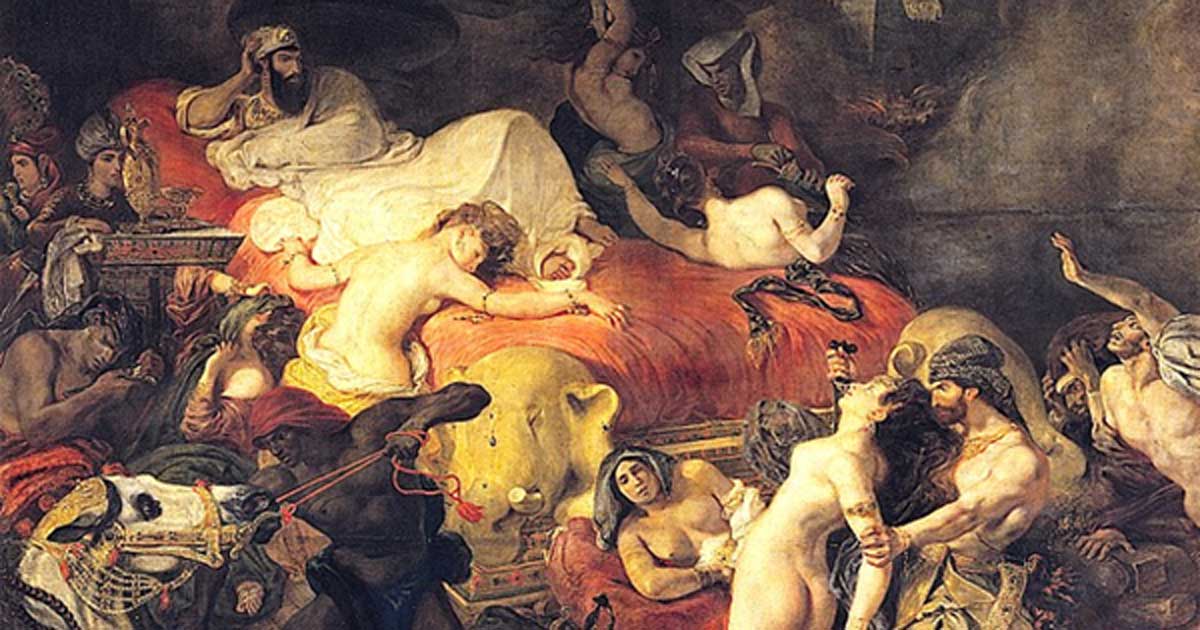Did the Pleasure-Seeking Epicurus Really Prescribe Hedonistic Happiness?
Epicureanism is a philosophical system based on the teachings of Epicurus which is, in today’s world, often equated with hedonism. Whilst this may be true to some extent, it is an over-simplification of this school of thought, as the teachings of Epicurus on pleasure is but a small fraction of his whole philosophy. Seek pleasure, yes, but do it modestly.
What is Epicureanism?
During the Hellenistic period, Epicureanism was one of the three main schools of philosophy, the other two being Stoicism and Scepticism. The teachings of Epicurus remained popular in the Roman Empire, but later on fell out of favor, and were even suppressed, when Christianity rose to prominence. During the 17 th century, Epicureanism was revived as a philosophical thought, and the writings of Epicurus played an important role not only in social and political thought, but also laid the foundations of certain modern sciences, such as physics, chemistry, and astronomy.
- The Legend of Oisín and the Fabled Island of Tír na nÓg - A Tale of Paradise, Love, and Loss
- What Role Did Skepticism Play in the Conquests of Alexander the Great?
- Zombie Powder, Bird Saliva, and Rotten Shark: Would You Try These Ancient Foods?

Roman Epicurus bust. (Public Domain)
Who was Epicurus?
Epicurus is recorded to have been born on the island of Samos in 341 BC. His parents, Neocles and Chaerestrata, were both Athenian settlers, and were expelled from the island by Perdicas, one of Alexander the Great’s successors. At that time, Epicurus was in Athens, and left the Greek city state in 321 BC to join his family, who had settled in Colophon, a coastal city in modern day Turkey. It was here that Epicurus studied philosophy under Nausiphanes, a disciple of Democritus (remembered primarily for his atomic theory of the universe). After ten years in Colophon, Epicurus moved to the island of Lesbos, and thence to Lampsacus. In both places, Epicurus began to teach, and to gather disciples. The philosopher returned to Athens in 307/6 BC and lived there till his death in 270 BC.
The Epicureanism and Hedonism Confusion
Whilst Epicureanism is commonly regarded today as an equivalent of hedonism, it is not entirely true. Although Epicurus did identify pleasure as primary component of human happiness, he argued that mental pleasure is superior to that of the body. Additionally, Epicureanism does not advocate pleasure as an end in itself, but the pursuit of pleasure ought to be aimed at reducing one’s pain. Furthermore, Epicureanism distinguishes two different types of pleasure, ‘static’ and ‘kinetic’, the former being a state of well-being, whilst the latter pleasures of a non-necessary kind. The negative association that Epicureanism has with hedonism today partly stems from the writings of early Christian authors, who argued, based on the little they knew about this school of philosophy, that Epicureanism was not compatible with Christianity.
The life model that Epicurus actually described (and lived) was one that focused on friendship, contemplation, medication and very simple living. He is said to have survived on just bread, olives, cheese and occasional weak wine.

Mosaic floor with slaves serving at a banquet, found in Dougga, 3rd century AD. (CC BY-SA 2.0)
Influence on the Freedom from Harm Principle
Closely linked to the Epicurean pursuit of pleasure is its concept of justice as a social contract. Epicurus defined justice as an agreement ‘neither to harm nor be harmed’. Laws and punishments are necessary to protect members of a society from harm, which would in turn allow them to pursue happiness. This concept would later inspire such figures as the 17 th century English philosopher John Locke, the American founding father, Thomas Jefferson, and the thinkers of the French Revolution. Thus, the social and political impact of Epicureanism may be said to be felt even today.
- The Ancient Greek Symposium: Just an Excuse for Debauchery?
- 10 Secrets About Ancient Greece That Are Rarely Recounted
- Plotinus: Platonism with a Twist for Christian, Muslim, and Jewish Thinkers
Early Atomic Theory
Yet another important contribution of Epicureanism to the modern world is that of atomic theory. According to Epicurus’ atomic theory, the general scheme of which was inherited from earlier atomists, especially Democritus, “the elementary constituents of nature are undifferentiated matter, in the form of discrete, solid and indivisible particles (“atoms”) below the threshold of perception, plus empty space, that is, the complement of matter or where matter is not” Although Atomism was shunned for many centuries, it began to rise in popularity from the 17 th century onwards. For instance, Pierre Gassendi, a French priest and philosopher, sought to reconcile Atomism with Christianity. Thus, he argued that atoms were created by God out of nothing. The philosophy of Atomism entered the realm of science during the early 19 th century, when John Dalton published his atomic theory of matter, which has become the basis of all modern chemistry.
Top image: Death of Sardanapalus by Eugène Delacroix. Source: Public Domain
By: Wu Mingren
References
Cook, V., 1996. Epicurus & Epicurean Philosophy. [Online]
Available at: http://www.epicurus.net/
Diano, C., 2018. Epicurus. [Online]
Available at: https://www.britannica.com/biography/Epicurus
Duignan, B. & Diano, C., 2017. Epicureanism. [Online]
Available at: https://www.britannica.com/topic/Epicureanism#ref68366
Hanrott, R., 2018. Epicureanism after Epicurus – The influence of Epicurus on Western thought. [Online]
Available at: http://epicurus.today/epicureanism-after-epicurus-the-influence-of-epicurus-on-western-thought/
Konstan, D., 2018. Epicurus. [Online]
Available at: https://plato.stanford.edu/entries/epicurus/
New World Encyclopedia, 2017. Epicureanism. [Online]
Available at: http://www.newworldencyclopedia.org/entry/Epicureanism
Sedley, D., 2018. Epicureanism. [Online]
Available at: https://www.rep.routledge.com/articles/thematic/epicureanism/v-1
www.philosophybasics.com, 2018. Epicureanism. [Online]
Available at: https://www.philosophybasics.com/movements_epicureanism.html
www.the-philosophy.com, 2018. Epicureanism. [Online]
Available at: https://www.the-philosophy.com/epicureanism-definition



















